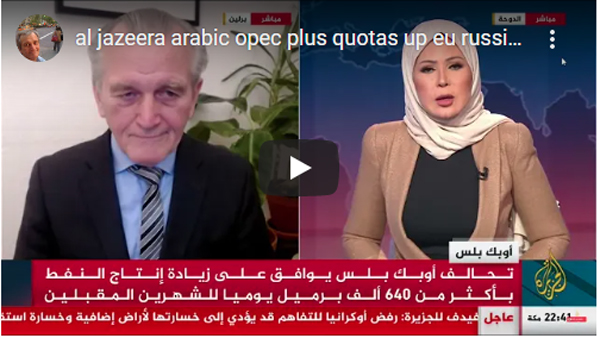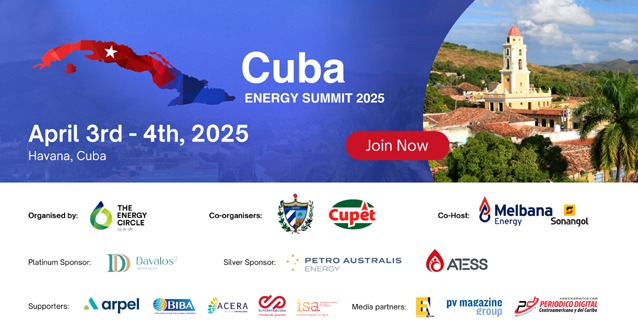
By Thomas O’Donnell
My Al Jazeera live, 2 June 2022, about 21:45 Berlin time.
A few points:
There was much concern over the past few months that OPEC (or OPEC+) was not going to assist the EU and USA with their embargos on Russian oil by producing more oil.
President Joe Biden had asked the Saudis and UAE to step up their output and OPEC+’s quotas, to tame high prices and facilitate the West’s plans to sanctions and kill Russian oil exports. When the Saudis refused, much was said about the Saudi’s anger at Biden and the USA for criticizing the Saudis’ bloody (and incompetent) war in Yemen and MbS having ordered dissident Saudi journalist Jamal Khashoggi killed and dismembered.
So too, much was written about the Saudi’s and GCC’s supposed new focus on allying with China, prioritizing serving the Chinese market. And especially much ink was dedicated to the presumed great loss of USA influence in the Gulf to both Russia and China, which was put down to the USA strategic drawdown in the Gulf Region in preference for its strategy (since Obama) of “Renewed Great Power Competition” vs. Russia and especially vs. China.
Added to this was the Biden administration’s attempt to get a new JCPOA with Iran, something the Saudis and much of the GCC are deeply opposed to.
I am not saying there is not some truth to each of these various explanations for why the Saudis and their partners refused to respond to Biden’s requests for more oil production, to bring down prices and help kill Russian market share after the start of the Ukraine War. What I am saying, however, is that all these commentaries and analysis missed the single key aspect holding back the Saudis from responding positively to Biden.
Simply put: even the EU still had not embargoed Russian oil imports to Europe! How could anyone have really expected the Saudis to turn on their Russian oil-market allies (within OPEC+) when even the European Union still had not placed sanctions on European purchases of Russian oil? So too, how could anyone expect the Indians (or the Chinese) to refuse to purchase new, reduced price Russian oil, when the EU had itself still not sanctioned purchases of this oil?
Once again, the medieval, plodding pace at which the EU comes to any decision, even in a time of war, was on all-too-public display. This time it was down to both Brussels’ fetish for unanimity, as well as active sabotage by Hungary’s pro-Putin Viktor Orban and extremely cautious attitudes in Berlin.
It took the EU an exorbitantly long time – three full months – to ban seabourne Russian oil imports. However, as I had predicted, once the EU did finally sanction Russian oil, the Saudis and OPEC are immediately beginning to seize on this new opportunity for greater market share. And, they can now do so without the Russian’s saying that they have openly turned on Moscow. They can blame the EU (and USA) sanctions.
To hear it from the Saudis and UAE, this is “just business,” and in fact it actually is “just business” for them. Objectively, the Russians are now going to be taken out of the global oil market step-by-step as a result of USA and EU sanctions, and the Saudis and OPEC are simply taking the market shares the Russians are losing. OPEC+ has increased its monthly output quotas by almost 50%. to 648,000 bpd per member state from 450,000 bpd,
However, aside from Saudi Arabia and the UAE, there is really no spare capacity among OPEC states to put on the market. OPEC+ has actually fallen about 2.5 million barrels per day behind over the last few months in meeting its increased-production quotas. The Saudis might soon move, as they have traditionally done in years past, to pump well over their own quota, to make up for such shortfalls in the market. What does this require?
This requires that OPEC+/OPEC members b authorized to take over Russia’s quota for themselves on the basis that Moscow cannot meet its quota while under sanctions. This is termed an “exemption from its quota.” This sort of exemption has long been granted to both Iran and Venezuela, and previously to Libya, long iconic pariah-failed-oil-states, targeted by US and international (UN, etc.) oil export sanctions.
That is to say, Russia is now being reduced to a status within OPEC and the global oil market (e.g., the “Global Barrel”) heretofore reserved for the likes of Venezuela and Iran. It is no wonder that Russian foreign minister Lavrov was frantically meeting with first the Saudi foreign minister and then the UAE foreign minister this week before, before the Thursday OPEC+ decision to raise export quotas by some 50% and start moving to take the global market share Russia is losing.
This is an oil-sector strategic disaster for Moscow. Moscow has already been forced by initial oil-sanctions and voluntary restrictions, placed by foreign states and firms, to shut in perhaps 1.0-1.5 million barrels per day of its oil production. The IEA predicts that by year’s end this might now reach 3 mbpd. This is a huge hit to Putin’s state revenues. Considering the “nuclear” sanctions already imposed on Moscow’s access to foreign exchange, Putin’s state absolutely needs a steady stream of oil and gas revenues in order to finance his war against Ukraine and to fight against the economic crisis engulfing the domestic Russian economy.
This is why the EU’s move to sanction Russian seabourne oil, albeit frustratingly hesitant, late and partial as (as is almost everything the EU does) is, nonetheless, so important. As I have written here and repeatedly explained in interviews posted on GlobalBarrel.com over the past three months, it was completely possible for the EU to have immediately sanctioned imports of all Russian oil after the Russian 24 February invasion of Ukraine, and most especially all seabourne oil. (I have also elaborated reasons why it has also been possible to embargo pipeline oil imports via the Druzhba pipeline. These reasons have to do with the large amounts of oil already in storage along this pipeline, and the methods of ersatz supply which are possible, including unit trains of tanker cars, etc.. However, Minister Habeck in Germany has been excessively cautious to cut these Russian pipeline-oil imports until all supply problems are solved first, ahead of time.)
There were various reasons for the Saudi/OPEC refusal to boost its oil production significantly until the EU took responsibility for killing Russia’s market position. However, likely the main one was the unwillingness of the Saudis’ to toss aside their hard-won alliance with Russia. The Saudis had forced Moscow under OPEC+ discipline by having resoundingly won the brief “Oil Price War” of March 2020, a war which Moscow had recklessly begun, it proved a strategic blunder which led to a strategic humiliation for Putin, Sechin and Moscow in the oil sector. As a result of the Saudis’ win (recall how Putin had to beg Trump to mediate with MbS?), Moscow was forced into real cooperation with OPEC+ to tame oil markets as Corona began to sweep global oil markets.
So, clearly, the Saudis and UAE were not about to throw overboard this hard-won oil-sector disciplining of Moscow. However, now that the EU has imposed sanctions, Russia is objectivelly step-wise falling down-and-out of the global oil market; so for OPEC and the Saudis to occupy the lost Russian oil-market territory is now just business — and a profitable one at that.
The other lesson here ias that, once again, the EU didn’t realize the huge lever it was sitting on as it procrastinated in imposing these sanctions. Brussels has not been known for its “geostrategic thinking” and even this win, and the very favorable Saudi-OPEC response, is a surprise to Brussels and most esp. to worrywort Berlin..
__________________________________________________________________
Thomas O’Donnell is an well known Energy, Geopolitics of Global Oil/Gas Markets expert. He is Adjunct Faculty at Hertie School of Governance & Freie Universität-Berlin and has a PhD in Nuclear Physics from University of Michigan. Energiesnet.com does not necessarily share these views.
Editor’s Note: This article was originally published by Al Jazeera, on June 02, 2022. All comments posted and published on EnergiesNet.com, do not reflect either for or against the opinion expressed in the comment as an endorsement of EnergiesNet.com or Petroleumworld.
Use Notice: This site contains copyrighted material the use of which has not always been specifically authorized by the copyright owner. We are making such material available in our efforts to advance understanding of issues of environmental and humanitarian significance. We believe this constitutes a ‘fair use’ of any such copyrighted material as provided for in section 107 of the US Copyright Law. In accordance with Title 17 U.S.C. Section 107. For more information go to: http://www.law.cornell.edu/uscode/17/107.shtml.
EnergiesNet.com 06 06 2022












